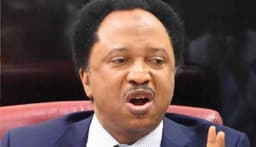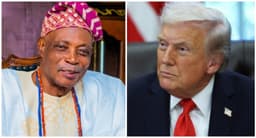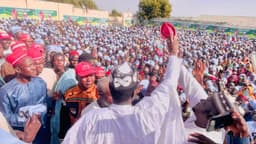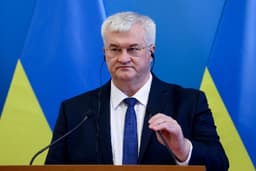
Governor Hope Uzodimma
Imo state Governor, Senator Hope Uzodimma has emphasised on the need for the constitutional roles of traditional rulers to strengthen the institution for the diverse responsibilities before it.
Speaking at the meting of the National Council of Traditional Rulers in Nigeria held at the Hotel Continental on Victoria Island in Lagos, the governor lamented that the 1979 constitution robbed traditional rulers of their constitutional roles,
He said the agitation by traditional rulers for constitutional recognition is not a privilege but that of clarity for the role they are already playing for the stability of the communities and the nation at large.
According to him, the absence of a constitutional role for traditional rulers is a gap that ought to be filled, saying it was a failure that should be immediately rectified.
“I believe the time has come to make it right, and not necessarily by creating a new role but by giving legal status to what already exists,“ he stated.
Uzodimma described the traditional institution as very unique in the architecture of power, attracting the best of the nation from politics, law, the military, and the academia.
He noted that given the enormous responsibility of the traditional rulers in peace mediation, conflict resolution, and custodians of tradition and culture, they out to be more respected through a constitutional role.
See the governor’s full speech below:
KEYNOTE ADDRESS BY HIS EXCELLENCY, DISTINGUISHED SENATOR HOPE UZODIMMA, CON, GOVERNOR OF IMO STATE, AT THE MEETING OF THE NATIONAL COUNCIL OF TRADITIONAL RULERS OF NIGERIA (NCTRN), HELD IN LAGOS ON MONDAY, OCTOBER 13, 2025
INTRODUCTION
Your Royal Majesties,
Thank you for the honour of addressing this gathering.
To be invited as both Special Guest of Honour and Keynote Speaker is a gesture I deeply appreciate
I come here as Governor, and also as someone grounded in the traditional institution by heritage. I was born into it. I was raised within its order. So I speak today with the insight of one who knows its place, its power, and its relevance in our national life.
This gathering offers the chance to speak clearly and directly about a subject that has occupied our national discourse for far too long; sometimes deferred, often debated, never quite resolved.
The theme before us: “THE TRADITIONAL INSTITUTION: THE IMPERATIVE OF ITS INCLUSION IN EFFECTIVE AND EFFICIENT GOVERNANCE IN NIGERIA”, is not just appropriate. It is necessary. And it is timely.
We are not here to ask for privilege. We are here to reflect on a reality: that across the country, traditional rulers continue to carry out responsibilities that are essential to the stability, cohesion, and governance of our communities.
However, these responsibilities remain informal, acknowledged in principle, but not secured by law. The point is that our traditional rulers have continued to play their roles, even without legal backing and sadly, without being sufficiently appreciated.
THE HISTORY AND THE GAP
Our history tells us that traditional rulers once held a defined place in Nigeria’s constitutional order. Their role was not symbolic. It was recognised by law.
Under the 1963 Republican Constitution, the Oba of Lagos was listed as an ex-officio member of the Senate, alongside other chiefs selected to represent the Lagos Territory. This provision, set out in Section 34(2)(ii) of the Constitution, gave traditional rulers direct legislative presence at the federal level.
Across the regions, the structure was even more entrenched.
Northern Region
The Northern Region Constitution established a House of Chiefs as one part of the legislative arm of the government. The northern regional government was modelled after the Westminster government of Britain. So the House of Chiefs was the equivalent of the House of Lords in Britain.
Section 5 confirmed that all first-class chiefs were automatic members of the House of Chiefs, with additional chiefs appointed by native authorities.
Western and Mid-Western Regions
The Western Region and the newly created Mid-Western Region followed the same model. Their legislatures also included Houses of Chiefs composed of recognised traditional rulers. These chiefs deliberated on regional matters, including issues relating to custom, land, and succession.
Eastern Region
The Eastern Region provided even broader constitutional recognition.
Section 4 of its 1963 Constitution created a legislature composed of the Governor, the House of Assembly, and the House of Chiefs.
Section 5(1)(a) declared that all traditional rulers in the region were ex-officio members of the House of Chiefs, not just first-class or selected chiefs, but the full traditional leadership structure.
Additional members were appointed to represent provinces and districts, and the House of Chiefs operated as a full legislative chamber.
So, across the country: North, West, East, and Mid-West, traditional rulers were not mere custodians of culture. They were constitutional actors, assigned formal duties within the architecture of regional governance.
That was the order the First Republic recognised.
It changed with the 1979 Constitution, which removed these roles. The 1999 Constitution did not restore them. And so began the drift into informality where traditional rulers were left with advisory positions defined not by law, but by the discretion of government.
This is not a question of nostalgia. It is a question of institutional memory, of legal continuity, and of acknowledging a role that is still being performed, every single day, in every part of this country.
Some will argue that because the first Republic was based on the parliamentary system of government, it was easy to accommodate in the legislative arm. This school will posit that a more republican Presidential system of government has no room for the Traditional institution. However, this is debatable.
WHAT THE TRADITIONAL RULERS ARE ALREADY DOING
Across communities, traditional rulers perform multiple roles, many of them parallel to those in the executive, legislative, and even judicial branches:
Settling land and family disputes where the courts have failed.
Supervising chieftaincy matters and succession plans with cultural precision.
Conferring titles that preserve heritage and encourage service.
Mediating between the government and the people in matters of policy and development.
Leading civic campaigns on peace, public health, elections, and security.
Mobilising their communities to support projects the government alone cannot execute.
Serving as custodians of culture and traditions.
These are the everyday works of governance carried out by men who draw their authority from history, not appointment; from community trust, and not political tenure.
THE AFRICAN CONTEXT: WHAT OTHER COUNTRIES HAVE DONE RIGHT
As I mentioned, some argue that Nigeria, being a republic, should not constitutionally recognise traditional rulers. They point to countries like France or the United States, where no such role exists. But those systems did not emerge from our realities. They were not built around our histories, and they cannot answer the questions our society must confront.
To understand what is possible, we must look to countries that, like us, have had to reconcile modern governance with deep-rooted traditions; countries that did not discard their heritage to build their democracy.
Let us look at three.
Ghana
Ghana’s 1992 Constitution offers a clear model. Under Chapter 22, Articles 270 to 277, the chieftaincy institution is explicitly guaranteed by the Constitution.
Article 270 declares that “the institution of chieftaincy, together with its traditional councils as established by customary law and usage, is hereby guaranteed.”
Article 271 establishes the National House of Chiefs, while Article 272 empowers it to advise the government on matters of chieftaincy and custom.
Regional Houses of Chiefs are also provided for, and Article 276 expressly bars chiefs from active party politics.
Ghana has not erased its traditional leadership. Instead, it has secured it, by law, as a stable, apolitical partner in national cohesion.
South Africa
South Africa’s Constitution of 1996 dedicates Chapter 12 to the role of traditional leadership.
Article 211(1) states: “The institution, status and role of traditional leadership, according to customary law, are recognized, subject to the Constitution.”
Article 212(1) provides for national legislation to define the role of traditional leadership in local governance.
These provisions are supported by the Traditional Leadership and Governance Framework Act, which regulate the functions of traditional leaders and establishes the National House of Traditional Leaders.
South Africa has constitutionalised what we in Nigeria have informalised. Yet, like Nigeria, South Africa is a diverse country grappling with history, identity, and modernity, and it chose recognition, not silence.
Namibia
Namibia provides a strong statutory and constitutional precedent.
Article 102(5) of the Namibian Constitution establishes a Council of Traditional Leaders to advise the President, particularly on issues concerning communal land.
The Council of Traditional Leaders Act, 1997 and the Traditional Authorities Act, 2000 further define the composition, powers, and functions of traditional rulers. They are empowered to advise on cultural affairs, local governance, and customary law.
In Namibia, traditional authority is not ceremonial. It is embedded in national law as a voice the President should listen to, and one the law protects.
You would agree with me that these are not fringe systems. Clearly, these are constitutional democracies that have found room for their traditional institutions without compromising the integrity of their republics.
The traditional ruler in these countries is not guessed at. He is recognised. His role is not assumed. It is defined. His influence is not debated. It is secured.
If Ghana, South Africa, and Namibia, all with multi-ethnic, postcolonial histories, can give constitutional expression, why not Nigeria with similar history and diversity?
THE RELEVANCE QUESTION
The continued influence of traditional rulers in Nigeria is not a courtesy extended by the state. It is a consequence of lived reality. Across towns and villages, traditional leaders remain the first point of contact in moments of crisis, the first to be consulted when tempers rise, and the last to retreat when disorder threatens stability.
It is not by chance that community-level peacekeeping, dispute resolution, moral guidance, and cultural preservation still fall to the palace. The law may be silent on this, but the people are not.
We must stop pretending that the absence of a constitutional role means an absence of function. I can tell you today without fear of equivocation that your relevance is not in question, was never in doubt and would never be in doubt. What is questionable is the failure of the system to give legal backing to a role it already depends on.
Truth is, traditional rulers represent the cultural and customary identity of the people. They serve as the unifying forces that bind our people together. The evidence of our history shows that our royal fathers have continued to play these roles, with or without constitutional protection.
ON NEUTRALITY AND MORAL AUTHORITY
This brings me to a related but important point. A point that must be addressed with honesty.
Your royal majesties, your continued relevance also rests on public trust. And that trust must be protected.
As Royal Fathers, your voice carries a weight that political office cannot replicate. You do not serve a party. You serve people. For that reason, the nation expects, and rightly so, that you will rise and remain above the noise of partisan politics.
That neutrality is not a weakness. It is strength. It gives credibility to your counsel and dignity to your institution.
To maintain that trust, the line must remain clear. You must speak when necessary, guide when needed, and send a warning when danger is imminent. This must be always be done as statesmen, not as political actors.
Your institution is unique in the architecture of power. It has no tenure, no retirement age, and no term limits. It attracts those who have served the nation: in the military, in law, in politics, in academia; because it is a seat of enduring honour. That honour must not be diluted.
Don’t let anyone drag your stool into the arena. And let no one mistake your dignified silence for irrelevance. A word from the palace, spoken in truth and without bias, and at the right time can shape the direction of a state. That is your strength. Please endeavour to protect and preserve it.
MOVING FORWARD
My position on this matter is straightforward.
The traditional institution remains one of Nigeria’s most enduring systems. Its custodianship of culture, its ability to mediate disputes, its place in the lives of the people; all make it indispensable to national stability.
The absence of a constitutional role is a gap that ought to be filled. It is a failure on our part that we have not updated our laws in line with our realities.
That is why I believe the time has come to make this right, not necessarily by creating a new role, but by giving legal status to what already exists. It is no different from formalising a long-standing union. The marriage is real. The only thing missing is the certificate.
Distinguished Royal Fathers, your call for constitutional recognition is not a demand for privilege. It is a demand for clarity and for the protection of a role that has survived war, colonisation, military rule, and political instability.
I assure you that if this matter comes before the National Assembly, or requires support at any level of government, I will stand with you without hesitation.
CONCLUSION
Let me end by thanking the National Council of Traditional Rulers of Nigeria for the invitation to address this distinguished assembly.
Your presence here today, in your numbers and with your experience, is proof that the institution you represent is alive, strong, and ready to lead where it must.
God bless our traditional institution.
God bless the Federal Republic of Nigeria.
Sen. Hope Uzodimma, CON
Governor, Imo State










.webp&w=256&q=75)
















NEWS EXPRESS is Nigeria’s leading online newspaper. Published by Africa’s international award-winning journalist, Mr. Isaac Umunna, NEWS EXPRESS is Nigeria’s first truly professional online daily newspaper. It is published from Lagos, Nigeria’s economic and media hub, and has a provision for occasional special print editions. Thanks to our vast network of sources and dedicated team of professional journalists and contributors spread across Nigeria and overseas, NEWS EXPRESS has become synonymous with newsbreaks and exclusive stories from around the world.